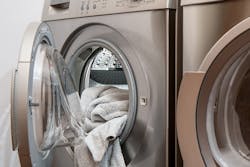Kansas Well Owners Face Groundwater Contamination From Former Dry Cleaner
Following the discovery of groundwater contamination from a former dry cleaner, the Kansas Department of Health and Environment (KDHE) has connected more than 200 homes served by private wells in near Wichita, Kan., to city water. The perchloroethylene (PCE) contamination was discovered in 2011 at 412 W. Grand during an investigation of a Kwik Shop expansion, and KDHE failed to notify residents of the contamination for more than six years. The health department is under fire for their failure to respond, which stems for ma controversial piece of Kansas legislation designed to protect dry cleaners.
According to the Wichita Eagle, the delays were because of the 1995 Kansas Drycleaner Environmental Response Act, which limits the the liability of a dry cleaning shop for contamination cleanup to $5,000. Instead, the law set up a tax on dry cleaning chemicals which has proved insufficient to pay for the extensive cleanup needed statewide. Furthermore, the law included a provision that directed the KDHE not to look for dry cleaner associated contamination and to strive to keep the sites off of the federal Superfund list.
KDHE said that they failed to notify impacted residents when the contamination was discovered in 2011 because they thought the contaminated groundwater was flowing in the opposite direction, southwest, when they later discovered it was flowing southeast and towards private wells. It then was discovered that many residents had groundwater contamination above the U.S. EPA advisory of 5 ppb for PCE. Residents were notified of the contamination in 2017 and hooking up the homes with impact wells to city water was completed in July 2018.
The contaminated groundwater has not been cleaned yet and the state is considering alternative funding solutions for the state’s dry cleaning contamination problems.
